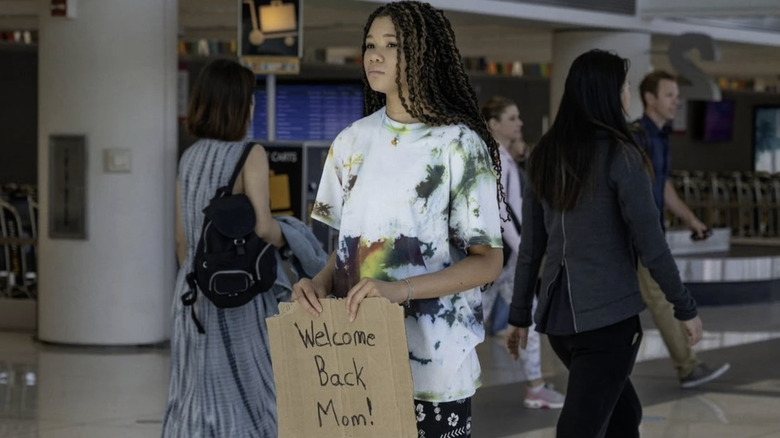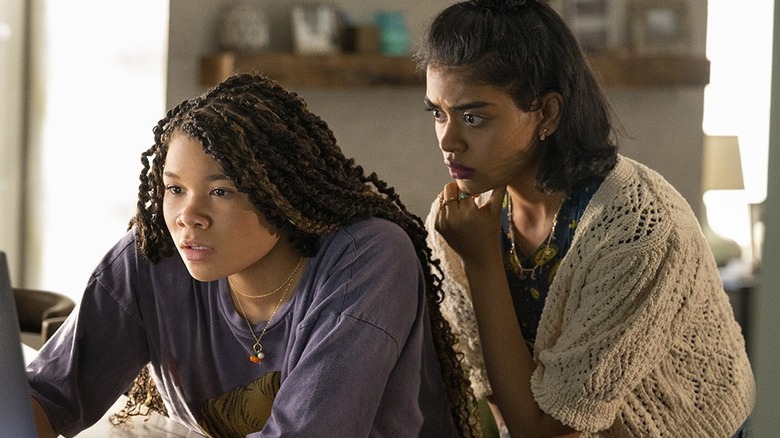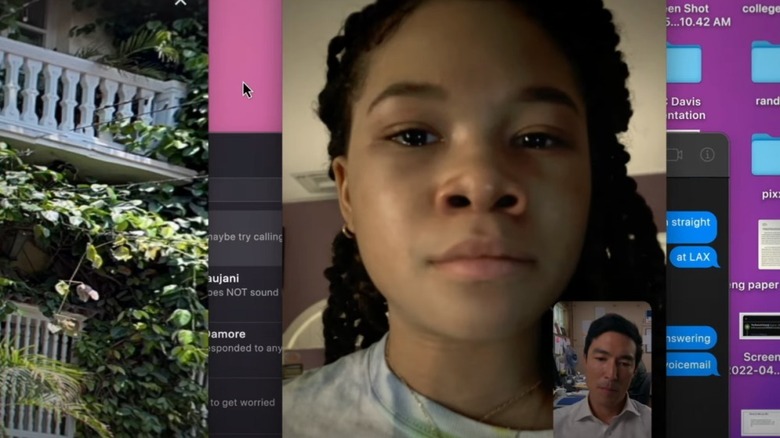Missing's Influences Included Gone Girl, Into The Spider-Verse, And Succession [Exclusive]
2018's "Searching" was not the first desktop film to grace cinemas, but it was arguably the most innovative. Directed by Aneesh Chaganty, the film fully realized the new role of modern technology and the internet within modern mystery narratives, and it also stumbled upon unique ways to characterize and tap into the internality of its characters through their screen usage and interactions with their phones and laptops.
Nearly five years later, a spiritual successor to "Searching" arrives in the form of Nick Johnson and Will Merrick's "Missing," another thrilling continuation of the screen life subgenre with even more tricks up its sleeve. Featuring strong performances from Storm Reid and Nia Long, "Missing" will not only scratch the itch for a twisty, suspenseful mystery, but will also present it in a way that is wholly fresh, original, and evocative of the digital age.
/Film's Ben Pearson spoke with the filmmakers behind the new "Searching" successor, and asked about their influences, which included contemporary mystery/thriller classics like "Gone Girl," as well as the high ambition and personal stakes of something like "Spider-Man: Into the Spider-Verse."
'We wanted this to be Spider-Verse'
As a work that shares plenty of stylistic elements with its sibling film, naturally, there's a similar admiration between Aneesh Changanty's inspirations and Nick Johnson and Will Merrick's. "Searching" had its roots in pulpy detective stories as well as David Fincher's modern mystery classic, "Gone Girl." "Yeah, I think there may be another 'Gone Girl' shout-out buried somewhere in this one as well," Merrick agreed. "That was a big one."
Outside of genre influences and small easter eggs, Merrick went on to explain how much more ambitious the scale of "Missing" is in comparison to "Searching," using the expansive trajectory of the "Spider-Man" franchise as a comparison:
"We talked a lot about how if the first 'Searching' was Sam Raimi's 'Spider-Man,' we wanted this to be 'Spider-Verse.' We looked at all the classic missing-person stories. We looked at social media information. But as far as the idea of a child looking for their parent, I don't think we ever found any comps. So really, a lot of the same influence as 'Searching,' plus 'Spider-Verse' and Edgar Wright, I would say."
One aspect where the "Spider-Verse" and Wright inspirations shine through the most in "Missing" is the film's fast pace and frantic energy. In a desktop feature, the editing truly takes the center stage. Despite being confined to a screen, the flow of "Missing" is never static. The directorial duo takes the time to zoom in, call attention to the most important details on the screen, and even come up with clever transitions that successfully convey the passage of time in unique ways. In one early scene involving a party, the camera rotates around June's body in a fast collage of different Snapchat stories, videos, and other social media posts.
The dynamic, pseudo-documentarian style of Succession
Nick Johnson continued to cite that Google and Facebook commercials had given the duo some perspective on how to convey certain emotions through technology, but in regards to the camerawork of "Missing" itself, one other big inspiration was HBO's "Succession," which features a dynamic handheld, pseudo-documentary that balances the comedy and darkness of the subject material brilliantly. "Google and Facebook commercials, and even 'Succession.' The way that the camera punches in through scenes. There's a little bit more of those camera punch-ins ... a lot of documentaries. Scenes from 'Home Alone.' Just everything."
In a direct role reversal of Aneesh Chaganty's original film, "Missing" follows the child's perspective in pursuit of a missing parent. It seems humorous at first, but there is a little bit of "Home Alone" in this story; in which a youth navigates the complexities of the adult world while public authorities fail to protect them. What separates these stories, however, is a few decades' worth of technological advancement and human dependence that makes "Missing" feel a lot more tangible to our reality.
The inspirations might seem to be pulled from everywhere and everything, but ultimately, that's the result of creating a film from a storytelling device that's young and full of endless potential.
"Missing" hits theaters on January 20, 2023.


